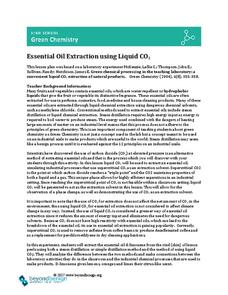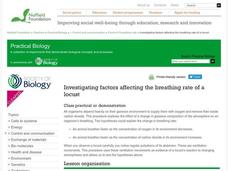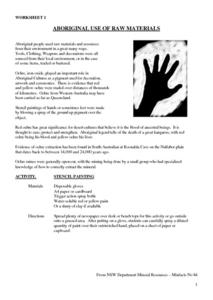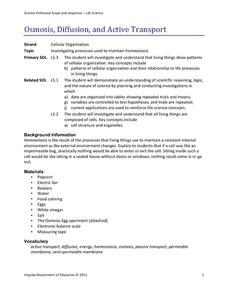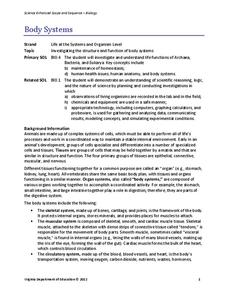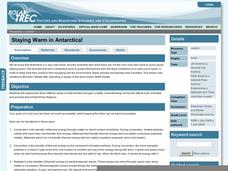Beyond Benign
Essential Oil Extraction Using Liquid CO2
When life hands you lemons ... experiment on them! Green chemistry gurus compare extraction methods for essential oils through a lab activity. Lab groups use traditional distillation and liquid carbon dioxide extraction methods, then...
Michigan Sea Grant
Wetlands
Wetlands may not sound particularly ornate, but they are as important as any habitat! With a hands-on activity, young scientists build a wetland model and observe its many functions in action. They discover the importance of wetlands to...
Curated OER
Acid Rain
Create a simulation of acid rain in your classroom with lemon juice and bean plants to help kids study the effects of pollution on plants. In addition, learners will listen to a story and write responses based on guiding questions.
Nuffield Foundation
Investigating Factors Affecting the Breathing Rate of a Locust
Do animals breathe faster when given more oxygen or more carbon dioxide? Young scientists observe the respiration rates of locusts under a variety of gas concentrations to answer that very question. They collect data, analyze the...
NSW Department Mineral Resources
Aboriginal Use of Raw Materials
What's the difference between base metals and precious metals? Experimenting with natural metals is an interesting way for kids to learn about the world around them. Use a resource that contains over 30 pages of worksheets and...
Rural Science Education Program
Bees and Flowers – Partners in Pollination
Why are bees so important? After several activities where kids investigate the form and function of flowers, they learn about the different types of bees and label them. They then examine pollen under a microscope and decide which bees...
Discovery Education
Fuss About Dust
Dust is everywhere around us; it's unavoidable. But what exactly is dust and are certain locations dustier than others? These are the questions students try to answer in an interesting scientific investigation. Working independently or...
Michigan State University
Gases Matter
Young scientists learn that seeing isn't necessarily believing when it comes to the states of matter. After performing a fun class demonstration that models the difference between solids, liquids, and gases, children complete a series of...
Baylor College
Needs of Plants
What better way to learn about plant life than by creating a class garden? Young botanists start with a brief discussion about radishes before planting seeds and watching them grow. To determine the importance of water, sunlight, and...
Virginia Department of Education
The Effects of Heat and Acid on the Enzyme Catalase
How quickly do enzymatic reactions occur? Assist the class as they examine heat and pH change to determine the rate of chemical reactions using catalase as an enzyme. Watch them "glow" with excitement!
Baylor College
Water in Your Body
Do you know how much water you have had in the last 24 hours? Do you know how much your body needs? In this hands-on activity, your class members will estimate how much water our bodies lose each day by filling and emptying one-liter...
Virginia Department of Education
Osmosis, Diffusion, and Active Transport
No, it really is okay to play with your food! Emerging scientists manipulate popcorn, eggs, and other household objects as they demonstrate multiple cellular processes. The activity, capable of modifications, is designed to reflect the...
Virginia Department of Education
Scientific Process and Experimental Design
The scientific method keeps you from believing only what you want to believe — it expands your mind. The lesson introduces the eight steps in the scientific process and how to design an experiment to biology scholars. Live insects...
Virginia Department of Education
Body Systems
The human body is an amazing thing! Explore the body with your high school class as they investigate each system in detail. They learn components of each organ system and disease processes that can negatively affect general health and...
Florida International University
Are You Concentrating?
Explore the importance of a concentration gradient in the rates of dissolution. Using the ocean ecosystem, learners study rates of dissolution around coral reefs. A hands-on experiment helps individuals discover the effects of changing a...
National Geographic
Expedition Clothing Then and Now
Introduce your class to the Everest expedition to reenact a 1924 climb by George Mallory and Andrew Irvine. Discuss and show pictures of the types of clothing worn at that time and compare it to today's state-of-the-art climbing gear....
Curated OER
Testing for Life’s Molecules
Want to hear a joke about sodium? Na. Young scientists test various materials to identify if they include protein, starch, and glucose by using the Biuret test, iodine starch test, and Benedict's test respectively. After practicing with...
University of Minnesota
Mirroring Emotions
Do you ever give your class the "teacher look"? Without saying a word, they become silent and engaged (hopefully). How do they know what you're thinking? Explore the concept of nonverbal communication and how it relates to our mirror...
Washington Office of Superintendent of Public Instruction
Using Our Senses to Observe
Look around and explore. Little ones use their five senses with some day-to-day activities designed to guide observation and apply STEM strategies. Young scientists learn through comparing/contrasting and observing with magnifiers as...
Polar Trec
Staying Warm in Antarctica!
Has your class ever wondered how animals and scientists stay warm in the Polar Regions? Kids will investigate to understand the three types of heat transfer and how heat transfer affects those trying to stay toasty in sub-zero...
Curated OER
Construction of a Microscale Fuel Cell
Fuel cells are being called the "energy source" of the future. Allow your high school chemistry class to construct a miscroscale fuel cell, complete with all components to generate energy. This engaging activity will allow them to apply...
Omaha Zoo
Monitoring Amphibians
What sort of shoes do frogs wear? Open toad sandals. If your scholars want experience collecting field samples, this is the lesson for you. After learning the proper way to collect field samples, pupils catch amphibians to test for...
Kenan Fellows
The Effects of Environmental Conditions on Aquatic Organisms
What kind of experiment can your class do to how observe the environment effects on organisms? Groups design and conduct lab experiments to learn about the effects of the environment on aquatic organisms. Based upon knowledge gained from...
Curated OER
Investigating the Effect of Minerals on Plant Growth
How do different minerals affect the growth of plants? Budding botanists find out in a multi-week experiment that has them using solutions with specific mineral deficiencies. While there is a lot of preparation for the investigation,...
Other popular searches
- Environment Science
- Environmental Science
- Environmental Science Games
- Environmental Science Unit
- Ap Environmental Science
- Living Environment Science
- Environmental Science Energy
- Environmental Science Maps
- Environment Science Labs
- Land Use Environment Science
- Environment Science Dilemma
- Environment Science Graphing


